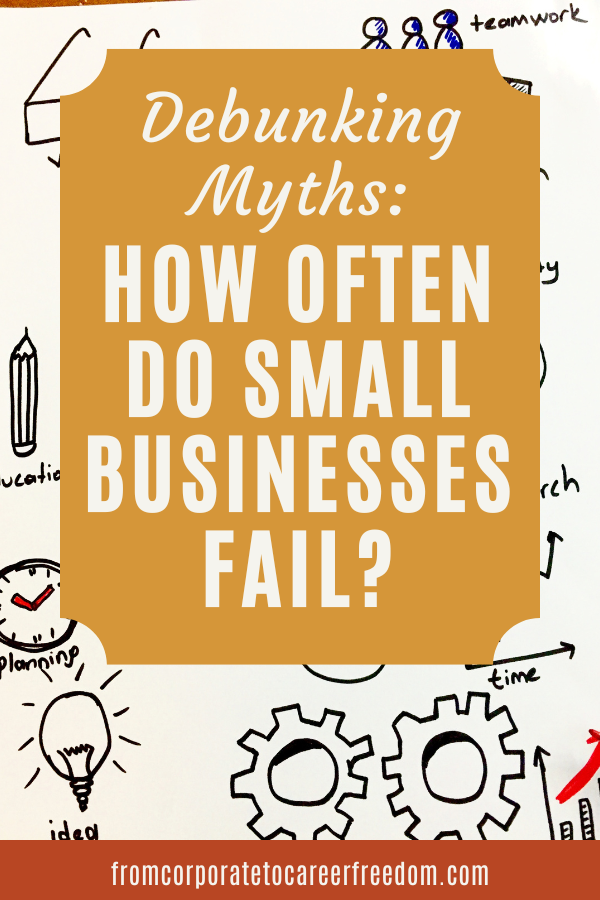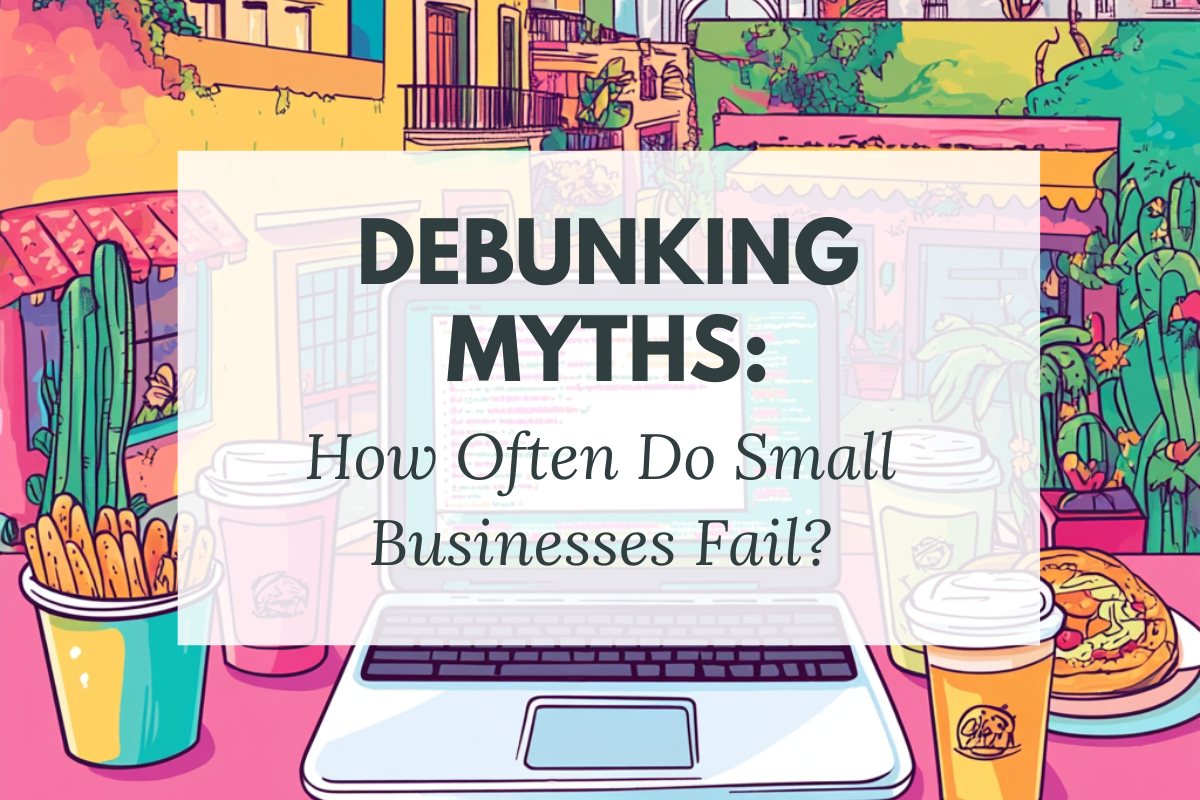In the swirling vortex of entrepreneurship, the haunting question, “How often do small businesses fail?” often lingers like a persistent shadow. Tales of meteoric rises juxtaposed with dramatic falls dominate headlines, painting a mesmerizing yet daunting canvas. Yet, beneath the surface of these stories lie a series of myths, misconceptions that have woven their way into the fabric of business lore. In our quest to shed light on the reality of startups, we aim to debunk these myths, emphasizing not the pitfalls but the pathways to success. Let’s unearth the truths and craft a narrative of resilience and triumph in the business world.

Myth #1: Most Small Businesses Fail Within the First Year
Reality: Many startups see growth and success in their inaugural year.
While many fear the dreaded first-year collapse, this isn’t the complete picture. In fact, many startups see substantial growth during their inaugural year. Success often boils down to diligent planning, understanding small business statistics, and avoiding common reasons for business failure. A robust financial plan, combined with a keen sense of market trends, can pave the way. Furthermore, seeking mentorship can offer invaluable insights, ensuring that your startup not only survives but thrives. Remember, it’s not just about avoiding pitfalls but proactively steering your business toward success from day one.
Myth #2: A Lack of Capital Always Means Failure
Reality: Resourcefulness and adaptability can triumph over financial setbacks.
Contrary to popular belief, capital isn’t the sole determinant of a startup’s success. While sufficient funding can ease the journey, it’s the resourcefulness and adaptability of a business that often makes the crucial difference. Some of the most notable success stories stem from startups facing financial challenges in their initial stages. By focusing on efficient cash flow management and understanding the specific challenges of your industry, you can navigate monetary constraints. Moreover, leveraging business mentorship can provide strategies to maximize limited resources. In the realm of entrepreneurship, a keen mindset often holds more weight than a hefty wallet.
Myth #3: Only the ‘Unique’ Ideas Succeed
Reality: Execution and market understanding often matter more than originality.
It’s a misconception that only groundbreaking ideas make waves in the business world. The truth is that many successful ventures are built on refining existing concepts. What really counts is the execution of the idea and a profound understanding of market trends and customer needs. Businesses that grasp small business statistics anticipate industry challenges, and engage deeply with their target audience often outperform those that solely rely on novelty. After all, it’s not about being the first; it’s about being the best in delivering value. By marrying a solid business strategy with impeccable execution, even familiar concepts can become market leaders.
Myth #4: Failure in Business Means Personal Failure
Reality: Every setback is a learning opportunity and a stepping stone to success.
In the entrepreneurial journey, equating business setbacks with personal inadequacy is a dangerous pitfall. Many iconic business leaders faced numerous setbacks before reaching their zenith. Instead of viewing business challenges as personal defeats, they are better seen as invaluable lessons. Embracing this perspective transforms every hurdle into a stepping stone to success. By analyzing business failure case studies and understanding the common reasons for business mishaps, one can extract vital insights. Each challenge faced is a chapter in the larger story of growth and resilience. Remember, in the grand tapestry of entrepreneurship, setbacks are mere stitches, shaping a larger narrative of triumph.
Myth #5: Established Markets Are Impossible to Penetrate
Reality: Even in saturated markets, there’s room for businesses that offer value and authenticity.
Diving into a market teeming with competitors can seem daunting, leading many to believe the waters are too crowded to make a meaningful splash. However, history has shown that even in saturated markets, businesses bringing genuine value and authenticity carve out significant niches for themselves. While understanding small business statistics and anticipating industry challenges is crucial, it’s equally vital to prioritize authenticity in your offerings. Customers gravitate towards brands they can trust and that resonate with them on a personal level. It’s not always about reinventing the wheel but rather about spinning it with unmatched finesse and sincerity.
Myth #6: All You Need Is Passion
Reality: Passion combined with a solid business strategy creates the recipe for success.
Passion is undeniably a driving force behind many successful ventures, igniting the initial spark. However, passion alone can’t sustain a business in the long haul. To truly thrive, this fervor must be channeled into a structured and well-thought-out business strategy. By meshing passion with thorough market understanding, effective cash flow management, and proactive responses to industry challenges, entrepreneurs lay the groundwork for lasting success. While passion may set the pace, it’s the fusion of emotion and methodical planning that propels a startup to greatness. In essence, it’s like a dance: passion leads, but strategy keeps the rhythm.
Myth #7: If You Build It, They Will Come
Reality: Beyond the product, effective marketing and customer relations are key.
This age-old adage may sound inspiring, but in today’s saturated markets, simply having a stellar product doesn’t guarantee a flocking audience. Beyond the creation phase, the power of effective marketing and fostering robust customer relations cannot be underestimated. Even the most revolutionary products require visibility and a resonant message to reach their target audience. It’s essential to blend product innovation with strategies that highlight its value in the eyes of potential customers. Engaging marketing, paired with genuine customer relations, ensures that not only do they come, but they also stay, advocate, and grow with your brand.
Myth #8: High Risk Always Equals High Reward
Reality: Prudent and calculated risks often lead to sustainable business growth.
The allure of the “go big or go home” mentality is tempting for many entrepreneurs. However, this mindset can sometimes overshadow the value of caution and meticulous planning. While risks are an integral part of the business landscape, they don’t always have to be monumental to yield significant rewards. By taking prudent and calculated risks, businesses can achieve sustainable growth, balancing potential returns with possible setbacks. Diving deep into business statistics, seeking mentorship, and understanding industry-specific challenges can guide decisions, ensuring risks are not just leaps into the unknown, but well-informed strides towards a prosperous future.
In Conclusion: Navigating the Startup Landscape
Highs and lows mark the journey of entrepreneurship, and you’ll hear the perpetual echo of “How often do small businesses fail?” Yet, as we’ve unveiled, beneath this question lie myriad myths waiting to be debunked. Recognizing and challenging these misconceptions paves the way for a more informed, resilient, and successful business journey. But the exploration doesn’t end here. Dive deeper, learn more, and let the spirit of enterprise guide you. We invite you to explore other startup articles on our website, offering insights and tools to further fuel your entrepreneurial ambitions.
Pin This Post To Read Later




